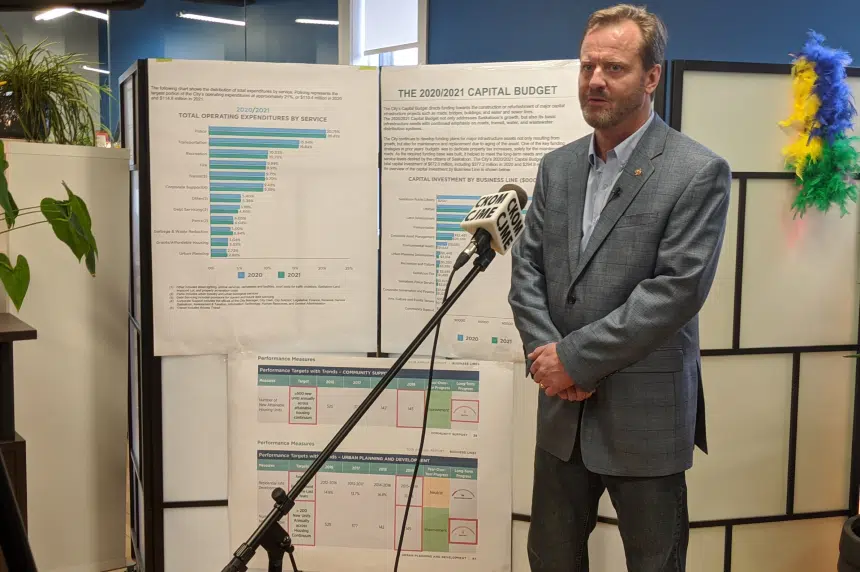Saskatoon mayoral candidates wasted no time getting back on the campaign trail following Monday’s provincial election.
Cary Tarasoff met with reporters on Wednesday to voice his concerns over the city’s first multi-year budget and its attention to big projects and not community supports.
If he is to be voted in as mayor on Nov. 9, Tarasoff said he would invest in affordable housing and community supports to provide social change. Pointing to sections of the city’s 2020-2021 capital budget, Tarasoff said priorities need to change in order to give affordable housing more than three per cent of the expenditures allotted to city services.
“Why are police budgets so high?” Tarasoff said, pointing to the nearly 21 per cent share given to police. “Because these budgets are so low. Police are having to step in and do more. Why is the Lighthouse such a big priority in our city for safety and security? Because these budgets are so low.”
Tarasoff said the city has failed to meet its goal of 500 new attainable housing units per year since 2017. Information from Tarasoff showed the city built 377 attainable units in 2017, 142 in 2018 and 145 in 2019.
“They have been failing to meet their targets,” Tarasoff said.
“It doesn’t have to be massive budgets, it has to be a shift in thinking. Budgets will come. Finding money sometimes isn’t actually the harder part, it’s getting people to understand that there’s significant reason to find that money.”
Tarasoff also lamented the cost of a new central library, saying fewer people are affected by a new library as opposed to affordable housing budgets.
Clark pitches free parking, winter activity fund
Charlie Clark used his time in front of reporters on Wednesday to pitch free parking and a one-time fund to keep Saskatoon active throughout the winter.
Clark’s $250,000 “Take it Outside” fund is aimed at community associations, business improvement districts, arts and sports non-profits and other local organizations. Those groups would apply for the grant, which is funded by Ottawa’s Safe Restart money allocated to provinces and territories, to take their activities outdoors. Criteria for the grants have not been created yet, and Clark wouldn’t say which groups would be given priority.
Free parking on Saturdays until the end of March would cost the city roughly $50,000 in revenue per month, or $200,000 total if free parking were to begin in December as Clark intends. Those are costs Clark is willing to stomach with the prospect of local businesses remaining largely inactive due to COVID concerns and chilly temperatures in the winter.
“The main reasoning for paid parking is to drive turnover,” he said. “I don’t believe that issue is going to be as urgent on Saturdays because we have less people in the downtown, and so this is just taking away some of those barriers for people to shop at a store with a door.”
Clark said redirecting federal dollars for the one-time fund won’t impact property taxes or the city’s operating budget.
Clark also clapped back at fellow candidate Rob Norris’ announcement on Tuesday of a one-time $5 million tax relief package for sports, arts, recreation and culture groups in Saskatoon.
Norris said the fund would be paid with $5 million from the city’s annual expenditures for vehicles and related vehicle costs, which would then be deferred for one year.
“This tax relief package helps make life more affordable for working families, seniors, students, and business owners in Saskatoon,” said Norris in a news release.
Clark said many groups, like the Saskatoon Minor Hockey Association, don’t own property and therefore would not qualify for the tax break. He added that removing funding allocated for city vehicles would greatly impact the city’s ability to remove snow and clear roads.
“The final problem is it puts another $5 million hole in the city’s budget,” Clark said.
“This is going down a dangerous road.”











